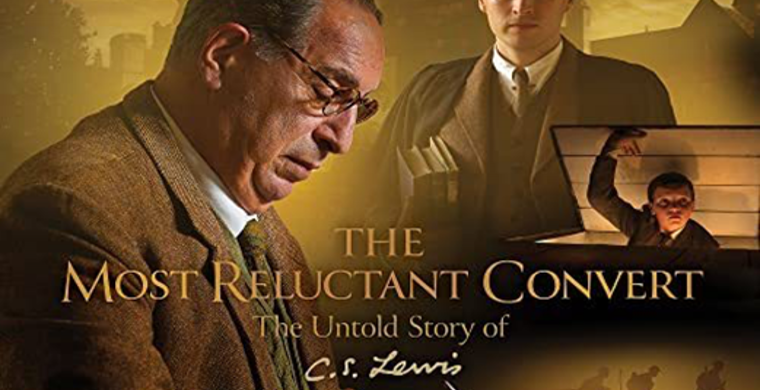The Most Reluctant Convert - the Untold Story of CS Lewis
By Chris Sugden
www.virtueonline.org
November 26, 2021
Max McLean founded the Fellowship for Performing Arts which is based in New York City and produces theatre and film with a Christian worldview. He co-directed the play CS Lewis Onstage- The Most Reluctant Convert which he has now brought to the screen. He plays CS Lewis himself and Norman Stone directed the film.
The film was shot in late summer 2020 in Oxford. It has been screened once in various cinemas throughout the UK, most recently on Sunday afternoon November 14, Remembrance Sunday. This was somewhat appropriate as the film shows that Lieutenant CS Lewis himself fought and was wounded in World War 1.
The cinematic screening began with a short documentary on The Making of the Reluctant Convert, with clips from the main feature and interviews with directors and the lead actors. They explain that this is CS Lewis in his own words.
Born in 1893, while he was still at junior school his mother died of cancer. "When she died, the wheels came off" Lewis says. He was taught by a private tutor, and went up to Magdelen College in 2014 to read Classics. He immediately joined up. He returned in 1919 and was a fellow of Magdelen from 1925-1954.
The artifice of the film is to follow the mature Lewis walking around Oxford, Magdelen College, Addisons Walk, New College Lane, the Bodleian Quadrangle, and in what became his local church, Holy Trinity Headington Quarry where he is buried. In his travels he tells direct to camera, as to an old friend, the story of his journey from atheism to taking Christmas Communion as a believer. He comes across himself as a young man at various stages of his intellectual journey, enters the scene and makes his comments to camera.
The film starts with Lewis powerfully rehearsing the arguments for atheism as he strolls through the University Museum - the universe is empty and has been for millions of years; what there is of nature and life is degenerating (entropy); those who do live suffer considerable pain and just enough happiness to put up with it; and if there is a god, then he is evil enough to make people sensory of their suffering.
CS Lewis was no young student when he became a Christian from 1929 onwards, but in his mid- thirties. Four main arguments stand out. First he abandoned materialism and embraced theism. He could not accept that imagination, reason, poetry, civilization and all the accomplishments of the human mind and spirit were just 'the random collision of atoms: they were more than biochemistry.' Second, he realized that if we judged that life and people could often be cruel, from where did the criteria come from to lead us to make that judgement? Third, he was convinced that Jesus of Nazareth was a genuine figure of history and came to distrust the patronizing view of Jesus as solely a 'good moral teacher'. The gospels were like no other literature. Friendship and conversations with Christians such as J.R.R. Tolkien convinced him that Jesus was either mad, bad or God. Fourth, he found it inconsistent that such profound moral teaching could be combined with clear megalomania and delusion. So the only conclusion was to accept that Jesus was the incarnation of a personal God; that we are made for another world, and that no one has ever met a mere mortal. There is the potential for immortality in everyone we meet.
His was an intellectual conversion and his reasoning was expressed in the film probably better than in books. A senior Christian leader commented at the end that 'it was true to Lewis's mind and true to his heart. I found it surprisingly moving and encouraging to hear such a thoughtful journey to faith from such a thoughtful man.'
If made available it could be a useful vehicle to view with both Christian and non-Christian friends and follow up with questions and discussion about the intellectual road to belief.
The Most Reluctant Convert has probably been made primarily for the North American market with its 85 minutes of walking around beautiful Oxford locations associated with Lewis in the company of 'the man himself' telling his story. The teenage granddaughters who came with us noted in particular the aesthetics of the film, the colleges, the books, the insides of college rooms and Eagle and Child (his pub) which, they suggested, prepared the viewer for lots of words about academics and books.
See trailer here: https://www.cslewismovie.com/home/
This movie was first reviewed in the Church of England Newspaper














